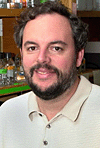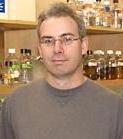Stephen J. Elledge, Ph.D.
Biochemistry & Molecular Biology
Howard Hughes Medical Institute

Jeffrey Wade Harper, Ph.D.
Biochemistry & Molecular Biology

Cdk inhibitors: on the threshold of cell cycle control and development
Drs. Elledge and Harper were recognized for their research on the mechanisms by which the cell regulates its division cycle. Loss of the cell’s ability to regulate its division is a critical step in the development of cancer. By synergistically merging the tools of genetics and biochemistry, Drs. Elledge and Harper isolated and characterized a human gene, CIP1, that encodes a critical negative regulator of the cell cycle. CIP1 binds and inhibits a class of protein kinases (cyclin-dependent kinases [Cdks]) that are required for the G1/S transition, the rate-limiting step in cell proliferation. CIP1 is transcriptionally regulated by the tumor suppressor p53. Mutations in p53 are the most commonly found lesion in human tumors, being present in more than 50% of all carcinomas.
The discovery by Drs. Elledge and Harper that p53 regulates an inhibitor of Cdks provided, for the first time, a mechanistic explanation of how this tumor suppressor protein negatively regulates the cell cycle. The fact that mutations in p53 are the most common lesion in human carcinomas indicates that loss of the CIP1 pathway is a critical determinant in tumorigenesis.
Drs. Elledge and Harper’s nomination was based on the following publications:
Dulic V, Kaufmann WK, Wilson SJ, Tlsty TD, Lees E, Harper JW, Elledge SJ, Reed SI."
p53-dependent inhibition of cyclin-dependent kinase activities in human fibroblasts
during radiation-induced G1 arrest.". Cell. 1994 Mar 25;76(6):1013-23.
Harper JW, Adami GR, Wei N, Keyomarsi K, Elledge SJ. " The p21 Cdk-interacting protein Cip1 is a potent inhibitor of G1 cyclin-dependent
kinases. ". Cell. 1993 Nov 19;75(4):805-16.
